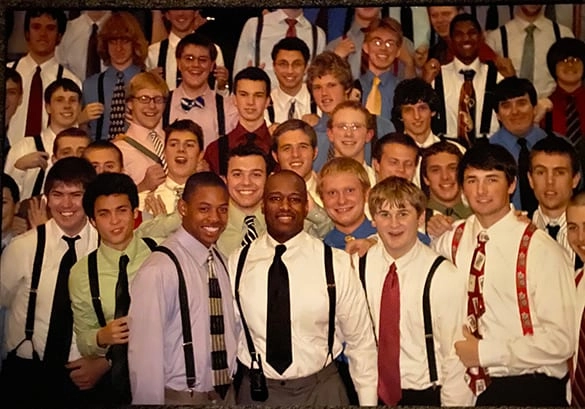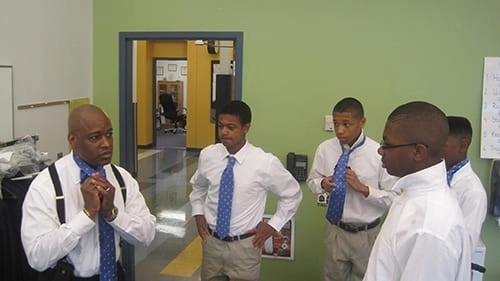By Jerry Duggan

Dr. H. Eric Clark has always been a champion of the underdog. From giving spare change to a person on the street corner to rooting for the underdog in a sporting event, Dr. Clark loves pulling for the little guy.
Clark grew up in North St. Louis with a divorced, single mother whose commitment to education led him to St. Louis University High School. In his sophomore year, an anonymous donor covered Clark’s tuition for the rest of his time at SLUH. From that day on, his mother, incredibly grateful for the gift that she later discovered was from her work supervisor, told her son he was to do “whatever SLUH asked him to do.”
“I’m still doing what they ask me to do today,” Clark remarked with a smile.
After graduating from the University of Missouri-St. Louis with a bachelor’s degree in psychology, Clark worked for the City of St. Louis Board of Election Commissioners and in his spare time served at his alma mater on several committees which, together, formulated a minority action plan to attract and retain talented students and staff of color.
One of the fruits of this committee’s labor was the implementation of a “director of diversity” position. By this time, Clark had also earned a master’s degree in psychology and was not content with his job; he felt he needed to do something more rewarding. He applied for the director of diversity position at SLUH and was hired in 1992. In the nearly three decades since, Clark has served in Jesuit educational leadership, achieving professional success and personal fulfillment.
From 1992 to 1995, Clark served as director of diversity, moderated the student council, created the school’s work grant program and taught general psychology.

In 1995, Clark was named an assistant principal and served as dean of students, earning a master’s degree in education at Saint Louis University along the way. In this role, Clark remained a champion of the underdog.
“I took great strides to make sure there was no bullying at the school,” he said. “It was my job to defend the underdogs – those who were outcasts, but also students of color, who were underdogs in their own right.”
Over the course of his tenure as assistant principal, then-SLUH president Fr. Paul Sheridan, SJ, alerted Clark of openings for administrative positions at Loyola Academy, a new middle school in north St. Louis designed to help primarily African American, economically disadvantaged but academically gifted young men reach their fullest potential. At first, Clark had no interest.
“I was happy at SLUH – in fact, I was so happy there that I assumed that is where I would retire if they would let me stay that long,” he said. “I asked Fr. Sheridan why he pushed me to consider this opportunity at Loyola several times, wondering if I had done something to upset him,” he said.
Father Sheridan explained that, while Clark was an incredible asset to the SLUH community, Jesuit educators are called to push themselves and not settle. In Fr. Sheridan’s opinion, Loyola Academy needed a voice like Clark’s even more than SLUH did. After much discernment, Clark took Fr. Sheridan’s advice and left SLUH in 2008, after more than 15 years of service.
For the past 12 years, Clark has been at Loyola Academy. He first had brief stints as principal and then president and principal and is currently serving as president of the school. During this time, he also completed his doctorate in educational leadership at SLU.
Although much of his job is administrative and involves fundraising, Clark also serves as a role model and inspirational figure to students.

“Our students are talented young men with potential to be real leaders in their community, but, due to socio-economic circumstances, they are underdogs,” Clark explained.
He sets the bar high for students and lets them know that they have everything they need to succeed.
“Despite their circumstances, I have high expectations for these young men,” he said. “People are counting on them to rise above the adversity, and people are counting on our school to help ‘transform’ them from lumps of clay into beautiful vases and pieces of coal into precious diamonds.”
According to Clark, a school like Loyola is the embodiment of what Jesuit education is all about.
“Jesus walked among the marginalized, and so that is what we are called to do in Jesuit education,” he said. “Loyola Academy is fulfilling that calling, and I’m honored I get to be a part of that, while encouraging these ‘underdogs’ every step of the way, taking these young men in their rawest form and turning them into precious gems – real leaders in their community and the world.”
